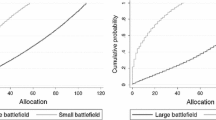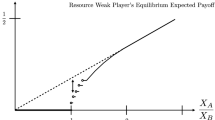Abstract
This article examines behavior in the two-player, constant-sum Colonel Blotto game with asymmetric resources in which players maximize the expected number of battlefields won. The experimental results support the main qualitative predictions of the theory. In the auction treatment, where winning a battlefield is deterministic, disadvantaged players use a “guerilla warfare” strategy that stochastically allocates zero resources to a subset of battlefields. Advantaged players employ a “stochastic complete coverage” strategy, allocating random, but positive, resource levels across the battlefields. In the lottery treatment, where winning a battlefield is probabilistic, both players divide their resources equally across all battlefields. However, we also find interesting behavioral deviations from the theory and discuss their implications.
Similar content being viewed by others
References
Amaldoss W., Rapoport A.: Excessive expenditure in two-stage contests: theory and experimental evidence. In: Columbus, F (eds) Game Theory: Strategies, Equilibria, and Theorems, Hauppauge., Nova Science Publishers, NY (2009)
Andreoni, J., Croson, R.: Partners versus strangers: the effect of random rematching in public goods experiments. In: Plott & Smith (eds.) Handbook of Experimental Economics Results (2008)
Avrahami J., Kareev Y.: Do the weak stand a chance? Distribution of resources in a competitive environment. Cogn Sci 33, 940–950 (2009)
Barut Y., Kovenock D., Noussair C.N.: A comparison of multiple-unit all-pay and winner-pay auctions under incomplete information. Int Econ Rev 43, 675–708 (2002)
Bellman R.: On Colonel Blotto and analogous games. Siam Rev 11, 66–68 (1969)
Blackett D.W.: Some Blotto games. Naval Res Logist Q 1, 55–60 (1954)
Blackett D.W.: Pure strategy solutions to Blotto games. Naval Res Logist Q 5, 107–109 (1958)
Borel, E.: La theorie du jeu les equations integrales a noyau symetrique. Comptes Rendus del Academie 173, 1304–1308 (1921); English translation by Savage, L.: The theory of play and integral equations with skew symmetric kernels. Econometrica 21, 97–100 (1953)
Borel, E., Ville, J.: Application de la theorie des probabilities aux jeux de hasard. Paris: Gauthier-Villars (1938). Reprinted in Borel E., Cheron, A.: Theorie mathematique du bridge a la portee de tous. Paris: Editions Jacques Gabay (1991)
Botelho A., Harrison G.W., Pinto L.M.C., Rutström E.E.: Testing static game theory with dynamic experiments: a case study of public goods. Games Econ Behav 67, 253–265 (2009)
Brown, J.N., Rosenthal, R.W.: Testing the minimax hypothesis: a re-examination of O’Neill’s game experiment. Econometrica, 1065–1081 (1990)
Camerer C.F.: Behavioral Game Theory: Experiments on Strategic Interaction. Princeton University Press, Princeton (2003)
Chau A., Phillips J.: Effects of perceived control upon wagering and attributions in computer blackjack. J General Psychol 122, 253–269 (1995)
Clark D.J., Konrad K.A.: Asymmetric conflict: weakest link against best shot. J Conflict Resolut 51, 457–469 (2007)
Clark D.J., Konrad K.A.: Fragmented property rights and incentives for R&D. Manage Sci 54, 969–981 (2008)
Crawford V.P., Iriberri N.: Fatal attraction: salience, Naïveté, and sophistication in experimental “hide-and-seek” games. Am Econ Rev 97, 1731–1750 (2007)
Croson R., Sundali J.: The Gambler’s fallacy and the hot hand: empirical data from casinos. J Risk Uncertain 30, 195–209 (2005)
Crutzen B.S.Y., Sahuguet N.: Redistributive politics with distortionary taxation. J Econ Theory 144, 264–279 (2009)
Davis D., Reilly R.: Do many cooks always spoil the stew? An experimental analysis of rent seeking and the role of a strategic buyer. Public Choice 95, 89–115 (1998)
Druckman J.: Evaluating framing effects. J Econ Psychol 22, 96–101 (2001)
Fischbacher U.: z-Tree: Zurich toolbox for ready-made economic experiments. Exp Econ 10, 171–178 (2007)
Friedman L.: Game-theory models in the allocation of advertising expenditure. Oper Res 6, 699–709 (1958)
Gneezy U., Smorodinsky R.: All-pay auctions—an experimental study. J Econ Behav Organ 61, 255–275 (2006)
Golman R., Page S.E.: General Blotto: games of strategic allocative mismatch. Public Choice 138, 279–299 (2009)
Gross, O., Wagner, R.: A continuous Colonel Blotto game. Unpublished article, RAND Corporation RM-408 (1950)
Hart S.: Discrete Colonel Blotto and General Lotto games. Int J Game Theory 36, 441–460 (2008)
Hausken K.: Strategic defense and attack for series and parallel reliability systems. Eur J Oper Res 186, 856–881 (2008)
Holt C.A., Laury S.K.: Risk aversion and incentive effects. Am Econ Rev 92, 1644–1655 (2002)
Klemperer P.: How (Not) to run auctions: the European 3G Telecom auctions. Eur Econ Rev 46, 829–845 (2002)
Klumpp T., Polborn M.K.: Primaries and the New Hampshire effect. J Public Econ 90, 1073–1114 (2006)
Kovenock D., Roberson B.: Inefficient redistribution and inefficient redistributive politics. Public Choice 139, 263–272 (2009)
Kovenock, D., Roberson, B.: The optimal defense of networks of targets. Purdue University, Working Paper (2009b)
Kreps D., Milgrom P., Roberts J., Wilson R.: Rational cooperation in the finitely repeated prisoners’ dilemma. J Econ Theory 27, 245–252 (1982)
Kvasov D.: Contests with limited resources. J Econ Theory 127, 738–748 (2007)
Laslier J.F.: How two-party competition treats minorities. Rev Econ Des 7, 297–307 (2002)
Laslier J.F., Picard N.: Distributive politics and electoral competition. J Econ Theory 103, 106–130 (2002)
Lizzeri A.: Budget deficits and redistributive politics. Rev Econ Stud 66, 909–928 (1999)
Lizzeri A., Persico N.: The provision of public goods under alternative electoral incentives. Am Econ Rev 91, 225–239 (2001)
Lugovskyy V., Puzzello D., Tucker S.: An experimental investigation of overdissipation in the all pay auction. Eur Econ Rev 54, 974–997 (2010)
Morgan, J., Orzen, H., Sefton, M.: Endogenous entry in contests. Econ Theory (2011, forthcoming)
Myerson R.B.: Incentives to cultivate minorities under alternative electoral systems. Am Polit Sci Rev 87, 856–869 (1993)
Parco J., Rapoport A., Amaldoss W.: Two-stage contests with budget constraints: an experimental study. J Math Psychol 49, 320–338 (2005)
Potters J.C., De Vries C.G., Van Linden F.: An experimental examination of rational rent seeking. Eur J Polit Econ 14, 783–800 (1998)
Powell R.: Defending against terrorist attacks with limited resources. Am Polit Sci Rev 101, 527–541 (2007)
Price C.R., Sheremeta R.M.: Endowment effects in contests. Econ Lett 111, 217–219 (2011)
Roberson, B., Kvasov, D.: The non-constant sum Colonel Blotto game. Econ Theory (2011, forthcoming)
Roberson B.: The Colonel Blotto game. Econ Theory 29(1), 1–24 (2006)
Roberson, B.: Pork-Barrel politics, targetable policies, and fiscal federalism. J Eur Econ Assoc, 819–844 (2008)
Robson, A.R.W.: Multi-item contests. Australian National University, Working Paper (2005)
Rosen S.: Prizes and incentives in elimination tournaments. Am Econ Rev 76, 701–715 (1986)
Sahuguet N., Persico N.: Campaign spending regulation in a model of redistributive politics. Econ Theory 28, 95–124 (2006)
Schelling T.C.: The Strategy of Conflict. Harvard University Press, Cambridge (1960)
Schmidt, D., Sheremeta, R.M., Shupp, R., Walker, J.: Resource Allocation Contests: Experimental Evidence. Indiana University, Working Paper (2011)
Sheremeta R.M.: Multi-stage elimination contests: an experimental investigation. Games Econ Behav 68, 731–747 (2010)
Sheremeta R.M.: Contest design: an experimental investigation. Econ Inquiry 49, 573–590 (2011)
Sheremeta R.M., Zhang J.: Can groups solve the problem of over-bidding in contests?. Soc Choice Welfare 35, 175–197 (2010)
Shubik M., Weber R.J.: Systems defense games: Colonel Blotto, command and control. Naval Res Logist Q 28, 281–287 (1981)
Snyder J.M.: Election goals and the allocation of Campaign resources. Econometrica 57, 637–660 (1989)
Strömberg D.: How the electoral college influences Campaigns and policy: the probability of being Florida. Am Econ Rev 98, 769–807 (2008)
Tukey J.W.: A problem of strategy. Econometrica 17, 73 (1949)
Walker M., Wooders J.: Minimax play at Wimbledon. Am Econ Rev 91, 1521–1538 (2001)
Author information
Authors and Affiliations
Corresponding author
Additional information
We have benefitted from the helpful comments of Jason Abrevaya, Tim Cason, Ron Harstad, Brian Roberson, seminar participants at the Free University of Berlin, Louisiana State University, Purdue University, and the University of East Anglia, and participants at the 2008 Annual Conference at the Centre for Studies in Social Sciences (Calcutta, India), the 2008 North American Annual ESA Conference, the 2009 Midwest Economic Theory Meetings, and the 2010 Public Economic Theory Conference. We also gratefully acknowledge extensive comments from an associate editor and two anonymous referees. This research has been supported by National Science Foundation Grant (SES-0751081).
Rights and permissions
About this article
Cite this article
Chowdhury, S.M., Kovenock, D. & Sheremeta, R.M. An experimental investigation of Colonel Blotto games. Econ Theory 52, 833–861 (2013). https://doi.org/10.1007/s00199-011-0670-2
Received:
Accepted:
Published:
Issue Date:
DOI: https://doi.org/10.1007/s00199-011-0670-2
Keywords
- Colonel Blotto
- Conflict resolution
- Contest theory
- Multi-dimensional resource allocation
- Rent-seeking
- Experiments




